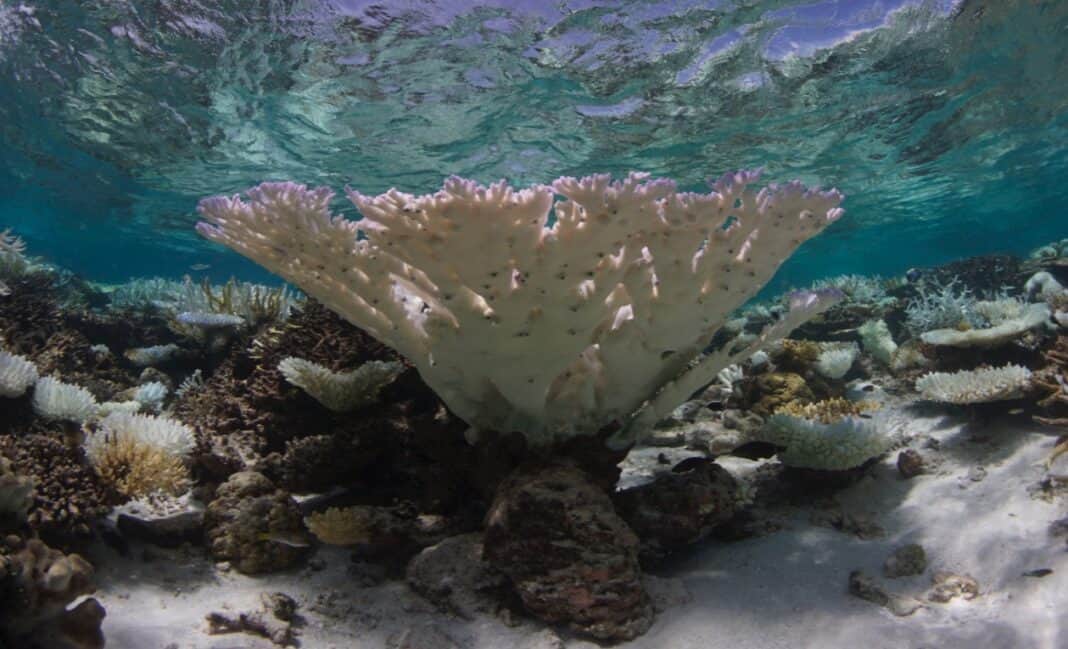The most intense global coral bleaching event on record is still ongoing, scientists are warning.
One year on from the official declaration of the fourth global coral bleaching event by the International Coral Reef Initiative (ICRI), bleaching alerts continue to develop across the world.
From January 1, 2023 to March 30, 2025, bleaching-level heat stress impacted 84% of the world’s reefs, with 82 countries, territories and economies suffering damage. During the first global coral bleaching event in 1998, 21% of reefs experienced bleaching-level heat stress, rising to 37% in the second event in 2010 and 68% during the third event (2014-2017).
Scientists called the fourth global coral bleaching event “unprecedented” as early as May 2024, and a widely-used bleaching prediction platform had to add three new levels (Levels 3-5) to their Bleaching Alert Scale to indicate the heightened risk of mass coral mortality. The previous highest level, Level 2, indicates risk of mortality to heat sensitive corals; Level 5 indicates the risk of over 80% of all corals on a reef dying due to prolonged bleaching.
Corals bleach when environmental stressors such as heat cause them to expel the colorful, energy-producing algae that live inside them, leaving them white. If conditions return to normal quickly enough, corals can regain their algae and return to health. However, if the water stays too hot for too long, corals die.
The main cause of large-scale coral bleaching events is higher ocean temperatures. Last year was the hottest on record and the first to reach over 1.5°C warmer than pre-industrial times, due to human-induced climate change. This contributed to record-breaking ocean temperatures, and triple the previous record number of marine heatwaves around the world.
Coral reefs are not just beautiful. About a third of all known marine life relies on reefs, and one billion people benefit from them directly or indirectly. Coral health has far-reaching impacts on the global economy, as reefs provide US$10 trillion/~€877.2 billion in benefits like food, jobs and coastal protection.
Unfortunately, live coral cover is estimated to have halved since the 1950s, with the Global Coral Reef Monitoring Network (GCRMN), an operational network of ICRI, evidencing a 14% decline from 2009 – 2018, due to a combination of local environmental damage and global climate change. Ensuring the health of the entire oceans, not just corals, would cost less than 2% of this sum. Losing coral reefs undermines efforts to achieve sustainable development, alleviate poverty, and ensure food security; climate-change induced coral loss could cost $500 billion/~€438.5 billion annually by 2100.
Although corals are in danger, through a combination of rapidly addressing local and regional drivers of loss, and implementing local conservation measures can still help them to survive the 21st century. Local solutions including well-planned coral restoration, reducing pollution, stopping overfishing, and selective breeding of corals can increase reef health and improve the resilience of reefs to hotter ocean temperatures.
The ICRI has developed eight key policy asks to guide the urgent action needed, and experts estimate that spending on corals needs to increase sevenfold. Additionally, limiting global warming to as little above 1.5°C as possible is necessary to give these coral conservation measures a chance to work. Current climate plans put the world on track for approximately 2.7°C of warming.
(Featured image: Coral bleaching in the Maldives, 2016. Photo credit: The Ocean Agency/Ocean Image Bank)

